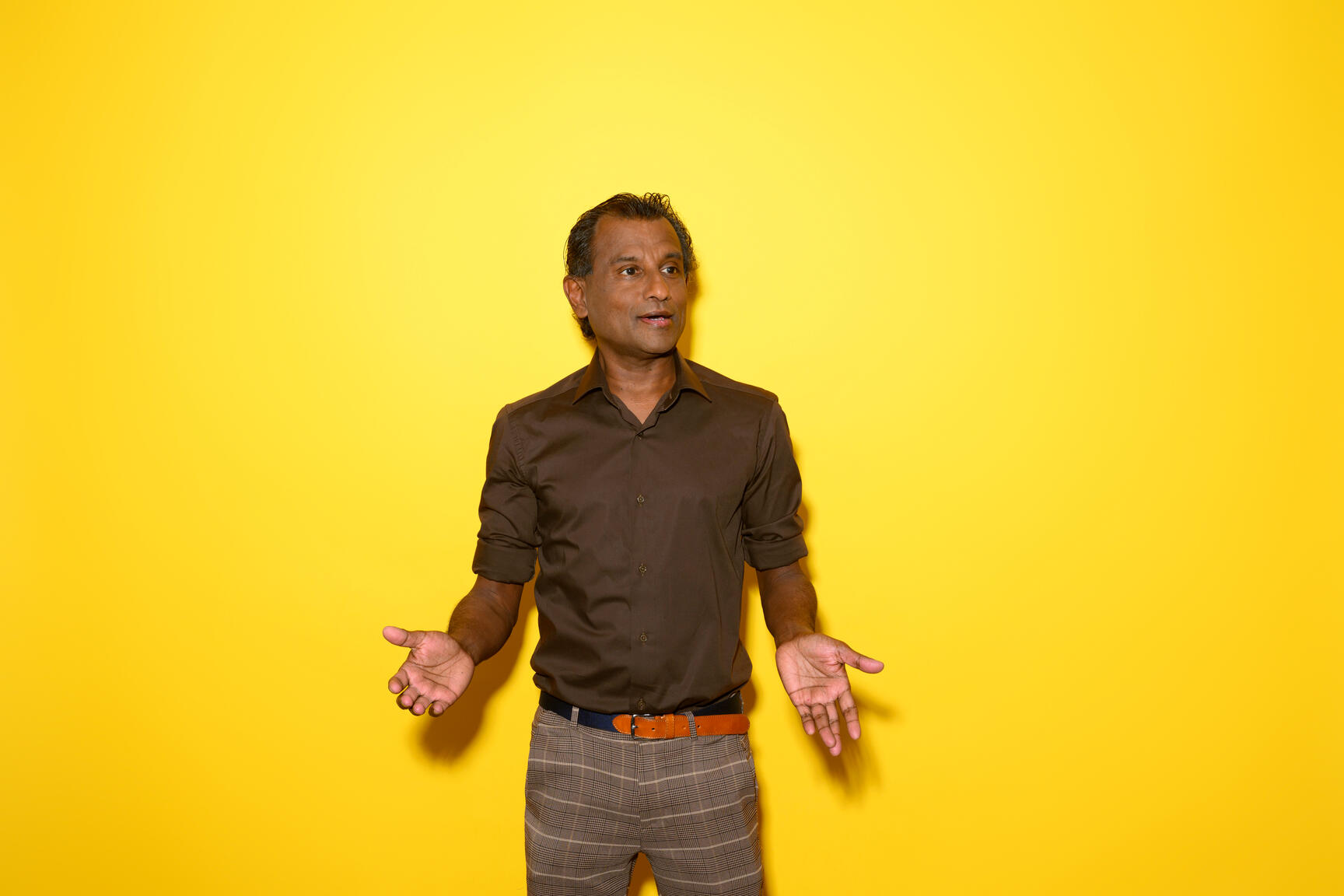
Role model Prabath Nanayakkara
Where are you from?
“My cradle was in Sri Lanka, where I was born in 1963,” says internist Prabath Nanayakkara, professor of acute internal medicine and head of the general internal medicine section at Amsterdam UMC. “After high school, I didn't know what I wanted to study; in any case, I had no vocation at all to become a doctor. Because I had high grades, the government offered me a place at the University of Colombo. 'Go study medicine,' my father said, 'then you can help people.' There was no money; I borrowed my textbooks from the library. During my studies the civil war broke out, that was a horrible time. I couldn't study anymore. To earn some money, I played guitar in a hotel. By chance I met a Dutch couple there, who helped me flee to the Netherlands. A nightmare, I thought at first. The Netherlands is a beautiful country, but if you are an outsider, like me, you have a hard time. I didn't know anyone, didn't speak the language and I didn't think about studying at all. I was only concerned with survival. Yet, again by chance, in 1989 I ended up at the VU, the only university open to me. With great pain and effort I was admitted, but I had to follow a modified program. As a result, I missed the introduction and fell out of the group. That was not easy for me, no, I felt quite lonely. Funnily enough, a few Surinamese students welcomed me with open arms. They took an interest in me, gave me books and included me in their group. That was very nice, slowly but surely I belonged, although I always continued to color outside the lines.”
Outside of work hours?
“I have a passion for music, I play guitar, I sing and I write songs. Music and medicine are both a form of art, one more scientific, the other spiritual, yin and yang. Both are also full of emotions. Music can also be healing. I have a busy job as a professor and head of a department and sometimes find it difficult to separate work and personal life. Making music for me is relaxation; when I have written a song it gives me enormous satisfaction. I am much more proud of a good song than of my scientific papers, haha.”
Under his stage name Serendib, the singer-songwriter scored a modest hit in 2000 with the song “How can I say.'' His albums can be found on Spotify. “Serendib is short for serendipity, which means ‘happy coincidence,’ just like my whole life. That also depends on happy coincidence. In addition, it is an ancient Persian name for Sri Lanka and says as much as: you look for one thing but find something else.”
What are your experiences with inclusion and diversity?
“With society changing, the hospital is also changing. Fortunately, there are more and more doctors and PhD students of color working here, although I am still treated differently when I don't have my white coat on. Indoors I never say doctor or professor, here I am just Prabath, but outside I do use my titles. There is definitely ethnic profiling in the Netherlands, at least at customs at Schiphol Airport. They usually detain me there, which is why I always bring my doctor's pass. I also always try to dress as well and correctly as possible, in a suit. People think differently about you then, in my experience. We have to be aware that there are intrinsic prejudices. When I did my internships in Haarlem thirty years ago, I was given a white coat with long sleeves, while my colleagues all wore short-sleeved coats. That lasted four days, when they realized I was not a cleaner. They wore long-sleeved coats. I also walked into the OR dressing room on the very first day and asked an anesthesiologist where I could find clogs. 'The clogs for cleaners are somewhere else,' I was told in reply. Very painful yes, especially for him by the way.”
Where are opportunities in Amsterdam UMC?
“I have been working in this hospital for a quarter of a century now; Amsterdam UMC really is my home. You should expect colleagues to show interest in each other, to know who you are and who they work with, but the other day I got very angry. I received an email from a secretary who has also worked here for a long time. She wanted to know if I was Eritrean or Dutch, because the hotel where a congress was being held for medical specialists asked that. I found that incredibly insulting and stupid. So despite all the progress, these things still happen. Now I'm fairly high up in the organization and have a big mouth, but imagine what it's like for colleagues who don't have that. As a hospital with many nationalities, you have to show interest in your employees. Make the effort to get to know each other, show interest, talk to people. Cleaners also have great stories to tell. There are cultural differences, the management has to be mindful of that. Diverse teams are the best teams, but difficult to manage. Some people you have to help a little, give them a chance to get used to it, give them that time. Not everyone who works here is as articulate as the average Dutchman. Things are going much better, but we're not there yet.”
Do you have any questions for Prabath or would you like to know more about diversity & inclusion within Amsterdam UMC? Then email to
diversiteit@amsterdamumc.nl
Text: Sophie Verschoor
